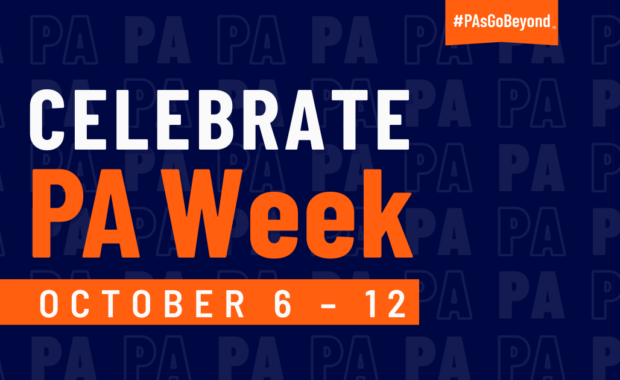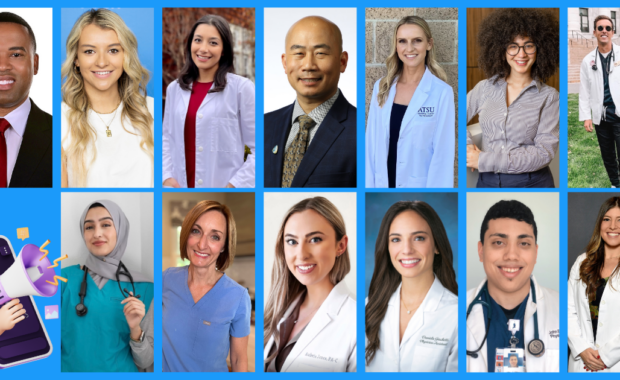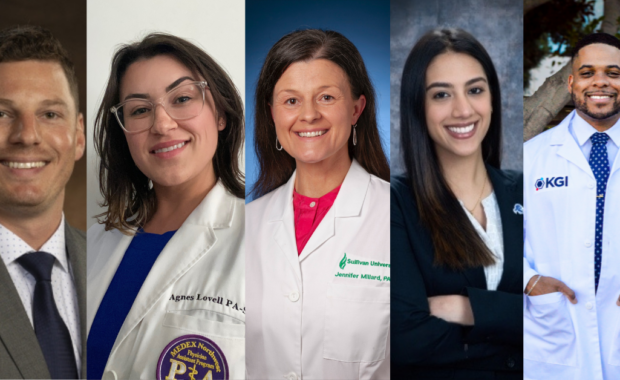PArenthood
Balancing PA School and Parenting
By Jennifer L. Walker
When Madeline Glasser started PA school at South University in Savannah, Georgia, her youngest daughter was a mere five weeks old. Her baby was nursing and waking up two or three times each night. But Glasser, who also has another daughter, age two at the time, still decided to pursue her lifelong goal of a career in medicine.
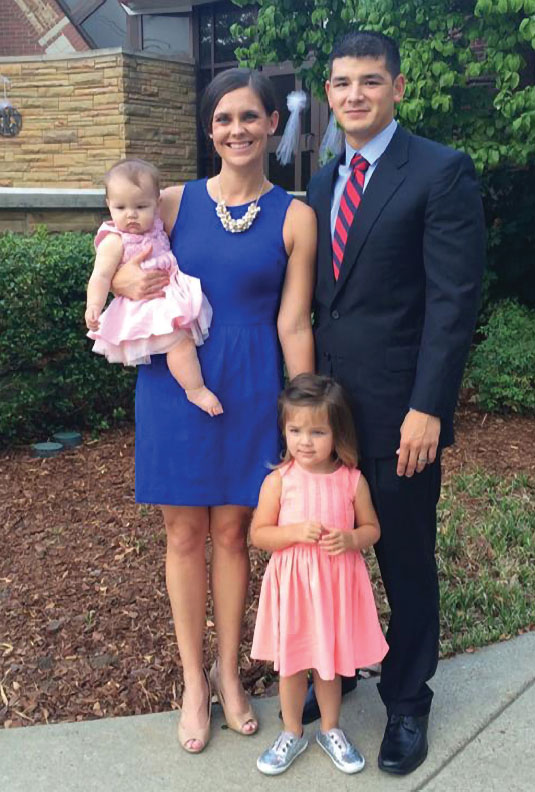
“My dad’s a physician. I grew up in medicine. I’ve always wanted to be in medicine,” she says. “It’s very important to me to show my daughters that you can have a family and you can be successful in a career that you choose.”
Still, getting through PA school is a challenge for anyone, and particularly for parents of young children. Fitting in hours of classes five days a week and study time at home can be overwhelming and stressful for any student. Then add the homework help, meal prep, daycare pick-up and drop-off, and bedtime routines that come with having kids, and it can start to feel like graduating is an unattainable goal.
But Glasser stresses that having kids is not an excuse to sideline career aspirations. In fact, “Kids are a reason to go to PA school,” says Glasser, who pumped milk for her daughter three times a day during her first year of school. “When I have those days when I start to wonder, ‘what am I doing?’—because I think that is a feeling that every PA student has—I have to remember my why. I know that I’m doing it for my family.”
Glasser had also already delayed pursuing a PA career for about five years. After graduating from the University of Arizona in 2009, she married a man who was in the military. Only five military installations in the U.S. are within commutable distance of a PA program, and she never lived close to one. So Glasser and her husband started a family, and she was a stay-at-home mom for a couple of years. Then, when her husband got an assignment in Georgia, Glasser was able to focus on her career.
“My husband and I really spent a lot of time discussing what we were going to do as a family to make sure our children’s needs were met, and that I was going to be able to graduate,” she says.
To navigate day care pick-ups and drop-offs—their biggest challenge—Glasser created a family calendar on Google that she can update throughout the day as needed. So if she has to stay late for a class, she makes a note of that; her husband then sees the note, and the two can make sure that someone is able to pick up their kids.
Making time for her family in the evenings is also important. To do this she has learned to use her time wisely when the kids are not around. “I always make good use of the time when my kids are at day care to go over some material,” Glasser says. Later, when she gets home, she puts PA school on the back burner so she can play with her daughters before they go to bed. “Giving them that one-on-one time is very important,” she adds.
Going It – Almost – Alone
These systems work for Glasser’s family because she has such a supportive husband, she says. But single parents like Debbie Bonney, a PA with an allergy and asthma clinic in Texas, may have to plan other strategies.
Ten years ago, when Bonney was a PA student at the University of South Dakota, her four children were ages 12, 11, nine, and seven. To attend school, Bonney had to move her family across the state, from the Black Hills on the western side of South Dakota to Vermillion on the southeastern tip, which meant her kids also had to adjust to a new home and a new school.
“It was complete stress,” says Bonney, who worked as a chemist and an environmental scientist for eight years, then stayed home with her kids for 12 years before starting PA school. “Luckily, my mom came from Michigan to stay with us that first year. She was able to do a lot of the running around, taking the kids to school and the laundry. She did a lot of the cooking for us. When I got home from school, she had dinner ready.”
Bonney says that sticking to a schedule helped during that first year. Her kids knew when it was time for dinner, studying, and bed, which “kept everything organized.” Seeing their mom go back to school also gave them an idea of what college would be like.
Long-distance Dadhood
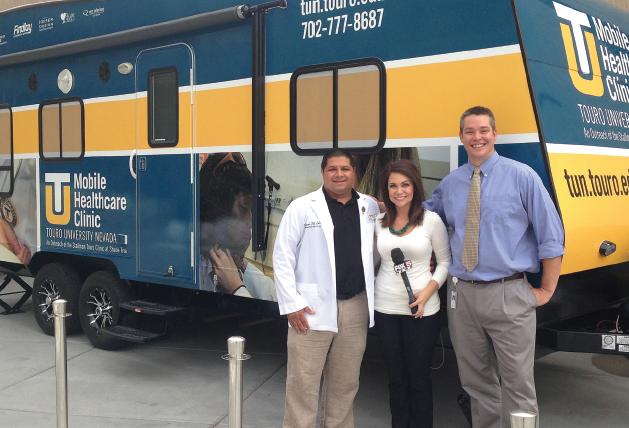
For other students, such as Tameem Sabry, being separated from their families during school is the biggest challenge. In 2013, when Sabry, an MBA graduate, moved to Henderson, Nevada to attend PA school at Touro University Nevada, his wife and daughter, a two-year-old at the time, stayed behind in California.
“We had the mentality of people who [are] in the military and they go overseas on deployment,” says Sabry, who most recently worked for a CD and DVD manufacturing company. “There was no obligation for me to come home. There was no obligation for me to help with our daughter. That was the mentality we shared.”
To ease the transition for his wife, who works in equipment funding and leasing, Sabry set up a good support system for her at home. She was living with her parents, who, along with his sister and her sister, were available to help with their daughter’s day care pick-ups and events when needed. For Sabry, school was easier without the distractions of his family, but he still needed to work through the emotional challenges that went with temporarily detaching himself from his every-day role as a father. After all, before he started PA school, he was a stay-at-home dad for 18 months while he completed his prerequisites.
“I was watching [my daughter] every day,” he says. “I was changing her diapers, feeding her, putting her down for naps, taking her to doctor’s appointments. [When we were separated], there was this emotional wreck of me that was happening, but you just refunnel it into studying to get your mind off of it.”
So that his daughter could see Sabry and hear his voice, he read her a book through FaceTime every night before she went to sleep. He also traveled home for the weekend when he didn’t have an exam the upcoming week, and his wife and daughter visited him every other month. After living in Nevada for 16 months, he is doing his clinical rotations back home and living with his family, which now includes an infant son who was born in February.
Making Worthy Sacrifices
Carrie Cubberly, a first year PA student and the single mom of a six-year-old daughter, also left family—in this case, her extended family in Michigan—to attend PA school, at Idaho State University. Cubberly had also been preparing to become a PA for years. Her previous job was in the insurance industry, where she had to review medical records daily. She noticed that some of the forms were signed by PAs, which sparked her interest in the profession.
“In insurance, I liked that I was able to help patients and set them up for surgery and treatment,” she says. “But I thought it would be better if I could actually see them in person. [In the PA profession], there’s a lot of interaction with people, but then there are also times when you sit down and do notes. I thought that was a good balance.”
Cubberly, who lived in Chicago at the time, started out slowly, taking her prerequisites one at a time and using her vacation time to shadow a PA every Friday for a month. During this time, she also got divorced. She looked at PA schools in Michigan, where her family lives, but they each required prerequisites that were different from the ones she had already completed. Idaho State University was the best fit.
Without family nearby, Cubberly’s support system came in different forms. During the first month of classes, her mom stayed with her in Idaho until she got into a rhythm with school and her daughter. Then, she found a before- and after-care center that would take her daughter until 9 p.m. on weekdays. Because the center is also open on weekends, she was able to take her daughter there for a six-hour stretch on a Saturday while she studied for four exams.
Other times, Cubberly, who has to take an online, open book quiz every night, which can take one to two hours in addition to reviewing material and attending classes, gets her daughter involved in her studies. “It’s a good educational experience for her, and she gets to feel like she’s involved,” she says. For example, when she was practicing her pass off for the pulmonary exam, she used her stethoscope to listen to her daughter’s lungs.
Although the workload is challenging on its own, one of the hardest aspects of PA school for Cubberly is that she temporarily has to ask her daughter to make sacrifices, too. As a single parent, Cubberly doesn’t have the time to enroll her in extracurricular activities like soccer, for example.
But, she says, echoing the advice of her fellow students, “Don’t feel guilty for [going to school]. My daughter is going to see that I worked hard toward something. And even though it’s a year of sacrifices, it’s going to pay off in the long run.”
Jennifer L. Walker is a Baltimore-based freelance writer.
This article was originally published in the September 2015 issue of PA Professional.
Thank you for reading AAPA’s News Central
You have 2 articles left this month. Create a free account to read more stories, or become a member for more access to exclusive benefits! Already have an account? Log in.
